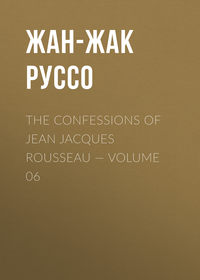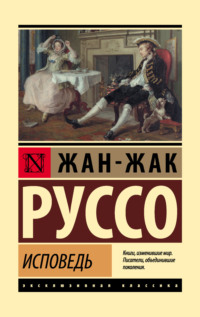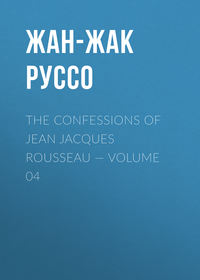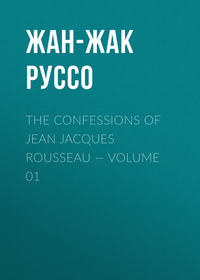 полная версия
полная версияThe Confessions of Jean Jacques Rousseau — Volume 11

Jean-Jacques Rousseau
The Confessions of Jean Jacques Rousseau — Volume 11
BOOK XI
Although Eloisa, which for a long time had been in the press, did not yet, at the end of the year, 1760, appear, the work already began to make a great noise. Madam de Luxembourg had spoken of it at court, and Madam de Houdetot at Paris. The latter had obtained from me permission for Saint Lambert to read the manuscript to the King of Poland, who had been delighted with it. Duclos, to whom I had also given the perusal of the work, had spoken of it at the academy. All Paris was impatient to see the novel; the booksellers of the Rue Saint Jacques, and that of the Palais Royal, were beset with people who came to inquire when it was to be published. It was at length brought out, and the success it had, answered, contrary to custom, to the impatience with which it had been expected. The dauphiness, who was one of the first who read it, spoke of it to, M. de Luxembourg as a ravishing performance. The opinions of men of letters differed from each other, but in those of any other class approbation was general, especially with the women, who became so intoxicated with the book and the author, that there was not one in high life with whom I might not have succeeded had I undertaken to do it. Of this I have such proofs as I will not commit to paper, and which without the aid of experience, authorized my opinion. It is singular that the book should have succeeded better in France than in the rest of Europe, although the French, both men and women, are severely treated in it. Contrary to my expectation it was least successful in Switzerland, and most so in Paris. Do friendship, love and virtue reign in this capital more than elsewhere? Certainly not; but there reigns in it an exquisite sensibility which transports the heart to their image, and makes us cherish in others the pure, tender and virtuous sentiments we no longer possess. Corruption is everywhere the same; virtue and morality no longer exist in Europe; but if the least love of them still remains, it is in Paris that this will be found.—[I wrote this in 1769.]
In the midst of so many prejudices and feigned passions, the real sentiments of nature are not to be distinguished from others, unless we well know to analyze the human heart. A very nice discrimination, not to be acquired except by the education of the world, is necessary to feel the finesses of the heart, if I dare use the expression, with which this work abounds. I do not hesitate to place the fourth part of it upon an equality with the Princess of Cleves; nor to assert that had these two works been read nowhere but in the provinces, their merit would never have been discovered. It must not, therefore, be considered as a matter of astonishment, that the greatest success of my work was at court. It abounds with lively but veiled touches of the pencil, which could not but give pleasure there, because the persons who frequent it are more accustomed than others to discover them. A distinction must, however, be made. The work is by no means proper for the species of men of wit who have nothing but cunning, who possess no other kind of discernment than that which penetrates evil, and see nothing where good only is to be found. If, for instance, Eloisa had been published in a certain country, I am convinced it would not have been read through by a single person, and the work would have been stifled in its birth.
I have collected most of the letters written to me on the subject of this publication, and deposited them, tied up together, in the hands of Madam de Nadillac. Should this collection ever be given to the world, very singular things will be seen, and an opposition of opinion, which shows what it is to have to do with the public. The thing least kept in view, and which will ever distinguish it from every other work, is the simplicity of the subject and the continuation of the interest, which, confined to three persons, is kept up throughout six volumes, without episode, romantic adventure, or anything malicious either in the persons or actions. Diderot complimented Richardson on the prodigious variety of his portraits and the multiplicity of his persons. In fact, Richardson has the merit of having well characterized them all; but with respect to their number, he has that in common with the most insipid writers of novels who attempt to make up for the sterility of their ideas by multiplying persons and adventures. It is easy to awaken the attention by incessantly presenting unheard of adventures and new faces, which pass before the imagination as the figures in a magic lanthorn do before the eye; but to keep up that attention to the same objects, and without the aid of the wonderful, is certainly more difficult; and if, everything else being equal, the simplicity of the subject adds to the beauty of the work, the novels of Richardson, superior in so many other respects, cannot in this be compared to mine. I know it is already forgotten, and the cause of its being so; but it will be taken up again. All my fear was that, by an extreme simplicity, the narrative would be fatiguing, and that it was not sufficiently interesting to engage the attention throughout the whole. I was relieved from this apprehension by a circumstance which alone was more flattering to my pride than all the compliments made me upon the work.
It appeared at the beginning of the carnival; a hawker carried it to the Princess of Talmont—[It was not the princess, but some other lady, whose name I do not know.]—on the evening of a ball night at the opera. After supper the Princess dressed herself for the ball, and until the hour of going there, took up the new novel. At midnight she ordered the horses to be put into the carriage, and continued to read. The servant returned to tell her the horses were put to; she made no answer. Her people perceiving she forgot herself, came to tell her it was two o'clock. "There is yet no hurry," replied the princess, still reading on. Some time afterwards, her watch having stopped, she rang to know the hour. She was told it was four o'clock. "That being the case," she said, "it is too late to go to the ball; let the horses be taken off." She undressed herself and passed the rest of the night in reading.
Ever since I came to the knowledge of this circumstance, I have had a constant desire to see the lady, not only to know from herself whether or not what I have related be exactly true, but because I have always thought it impossible to be interested in so lively a manner in the happiness of Julia, without having that sixth and moral sense with which so few hearts are endowed, and without which no person whatever can understand the sentiments of mine.
What rendered the women so favorable to me was, their being persuaded that I had written my own history, and was myself the hero of the romance. This opinion was so firmly established, that Madam de Polignac wrote to Madam de Verdelin, begging she would prevail upon me to show her the portrait of Julia. Everybody thought it was impossible so strongly to express sentiments without having felt them, or thus to describe the transports of love, unless immediately from the feelings of the heart. This was true, and I certainly wrote the novel during the time my imagination was inflamed to ecstasy; but they who thought real objects necessary to this effect were deceived, and far from conceiving to what a degree I can at will produce it for imaginary beings. Without Madam d'Houdetot, and the recollection of a few circumstances in my youth, the amours I have felt and described would have been with fairy nymphs. I was unwilling either to confirm or destroy an error which was advantageous to me. The reader may see in the preface a dialogue, which I had printed separately, in what manner I left the public in suspense. Rigorous people say, I ought to have explicity declared the truth. For my part I see no reason for this, nor anything that could oblige me to it, and am of opinion there would have been more folly than candor in the declaration without necessity.
Much about the same time the 'Paix Perpetuelle' made its appearance, of this I had the year before given the manuscript to a certain M. de Bastide, the author of a journal called Le Monde, into which he would at all events cram all my manuscripts. He was known to M. Duclos, and came in his name to beg I would help him to fill the Monde. He had heard speak of Eloisa, and would have me put this into his journal; he was also desirous of making the same use of Emilius; he would have asked me for the Social Contract for the same purpose, had he suspected it to be written. At length, fatigued with his importunities, I resolved upon letting him have the Paix Perpetuelle, which I gave him for twelve louis. Our agreement was, that he should print it in his journal; but as soon as he became the proprietor of the manuscript, he thought proper to print it separately, with a few retrenchments, which the censor required him to make. What would have happened had I joined to the work my opinion of it, which fortunately I did not communicate to M. de Bastide, nor was it comprehended in our agreement? This remains still in manuscript amongst my papers. If ever it be made public, the world will see how much the pleasantries and self-sufficient manner of M. de Voltaire on the subject must have made me, who was so well acquainted with the short-sightedness of this poor man in political matters, of which he took it into his head to speak, shake my sides with laughter.
In the midst of my success with the women and the public, I felt I lost ground at the Hotel de Luxembourg, not with the marechal, whose goodness to me seemed daily to increase, but with his lady. Since I had had nothing more to read to her, the door of her apartment was not so frequently open to me, and during her stay at Montmorency, although I regularly presented myself, I seldom saw her except at table. My place even there was not distinctly marked out as usual. As she no longer offered me that by her side, and spoke to me but seldom, not having on my part much to say to her, I was well satisfied with another, where I was more at my ease, especially in the evening; for I mechanically contracted the habit of placing myself nearer and nearer to the marechal.
Apropos of the evening: I recollect having said I did not sup at the castle, and this was true, at the beginning of my acquaintance there; but as M. de Luxembourg did not dine, nor even sit down to table, it happened that I was for several months, and already very familiar in the family, without ever having eaten with him. This he had the goodness to remark, upon which I determined to sup there from time to time, when the company was not numerous; I did so, and found the suppers very agreeable, as the dinners were taken almost standing; whereas the former were long, everybody remaining seated with pleasure after a long walk; and very good and agreeable, because M. de Luxembourg loved good eating, and the honors of them were done in a charming manner by madam de marechale. Without this explanation it would be difficult to understand the end of a letter from M. de Luxembourg, in which he says he recollects our walks with the greatest pleasure; especially, adds he, when in the evening we entered the court and did not find there the traces of carriages. The rake being every morning drawn over the gravel to efface the marks left by the coach wheels, I judged by the number of ruts of that of the persons who had arrived in the afternoon.
This year, 1761, completed the heavy losses this good man had suffered since I had had the honor of being known to him. As if it had been ordained that the evils prepared for me by destiny should begin by the man to whom I was most attached, and who was the most worthy of esteem. The first year he lost his sister, the Duchess of Villeroy; the second, his daughter, the Princess of Robeck; the third, he lost in the Duke of Montmorency his only son; and in the Comte de Luxembourg, his grandson, the last two supporters of the branch of which he was, and of his name. He supported all these losses with apparent courage, but his heart incessantly bled in secret during the rest of his life, and his health was ever after upon the decline. The unexpected and tragical death of his son must have afflicted him the more, as it happened immediately after the king had granted him for his child, and given him the promise for his grandson, the reversion of the commission he himself then held of the captain of the Gardes de Corps. He had the mortification to see the last, a most promising young man, perish by degrees from the blind confidence of the mother in the physician, who giving the unhappy youth medicines for food, suffered him to die of inanition. Alas! had my advice been taken, the grandfather and the grandson would both still have been alive. What did not I say and write to the marechal, what remonstrances did I make to Madam de Montmorency, upon the more than severe regimen, which, upon the faith of physicians, she made her son observe! Madam de Luxembourg, who thought as I did, would not usurp the authority of the mother; M. de Luxembourg, a man of mild and easy character, did not like to contradict her. Madam de Montmorency had in Borden a confidence to which her son at length became a victim. How delighted was the poor creature when he could obtain permission to come to Mont Louis with Madam de Boufflers, to ask Theresa for some victuals for his famished stomach! How did I secretly deplore the miseries of greatness in seeing this only heir to a immense fortune, a great name, and so many dignified titles, devour with the greediness of a beggar a wretched morsel of bread! At length, notwithstanding all I could say and do, the physician triumphed, and the child died of hunger.
The same confidence in quacks, which destroyed the grandson, hastened the dissolution of the grandfather, and to this he added the pusillanimity of wishing to dissimulate the infirmities of age. M. de Luxembourg had at intervals a pain in the great toe; he was seized with it at Montmorency, which deprived him of sleep, and brought on slight fever. I had courage enough to pronounce the word gout. Madam de Luxembourg gave me a reprimand. The surgeon, valet de chambre of the marechal, maintained it was not the gout, and dressed the suffering part with beaume tranquille. Unfortunately the pain subsided, and when it returned the same remedy was had recourse to. The constitution of the marechal was weakened, and his disorder increased, as did his remedies in the same proportion. Madam de Luxembourg, who at length perceived the primary disorder to be the gout, objected to the dangerous manner of treating it. Things were afterwards concealed from her, and M. de Luxembourg in a few years lost his life in consequence of his obstinate adherence to what he imagined to be a method of cure. But let me not anticipate misfortune: how many others have I to relate before I come to this!
It is singular with what fatality everything I could say and do seemed of a nature to displease Madam de Luxembourg, even when I had it most at heart to preserve her friendship. The repeated afflictions which fell upon M. de Luxembourg still attached me to him the more, and consequently to Madam de Luxembourg; for they always seemed to me to be so sincerely united, that the sentiments in favor of the one necessarily extended to the other. The marechal grew old. His assiduity at court, the cares this brought on, continually hunting, fatigue, and especially that of the service during the quarter he was in waiting, required the vigor of a young man, and I did not perceive anything that could support his in that course of life; since, besides after his death, his dignities were to be dispersed and his name extinct, it was by no means necessary for him to continue a laborious life of which the principal object had been to dispose the prince favorably to his children. One day when we three were together, and he complained of the fatigues of the court, as a man who had been discouraged by his losses, I took the liberty to speak of retirement, and to give him the advice Cyneas gave to Pyrrhus. He sighed, and returned no positive answer. But the moment Madam de Luxembourg found me alone she reprimanded me severely for what I had said, at which she seemed to be alarmed. She made a remark of which I so strongly felt the justness that I determined never again to touch upon the subject: this was, that the long habit of living at court made that life necessary, that it was become a matter of amusement for M. de Luxembourg, and that the retirement I proposed to him would be less a relaxation from care than an exile, in which inactivity, weariness and melancholy would soon put an end to his existence. Although she must have perceived I was convinced, and ought to have relied upon the promise I made her, and which I faithfully kept, she still seemed to doubt of it; and I recollect that the conversations I afterwards had with the marechal were less frequent and almost always interrupted.
Whilst my stupidity and awkwardness injured me in her opinion, persons whom she frequently saw and most loved, were far from being disposed to aid me in gaining what I had lost. The Abbe de Boufflers especially, a young man as lofty as it was possible for a man to be, never seemed well disposed towards me; and besides his being the only person of the society of Madam de Luxembourg who never showed me the least attention, I thought I perceived I lost something with her every time he came to the castle. It is true that without his wishing this to be the case, his presence alone was sufficient to produce the effect; so much did his graceful and elegant manner render still more dull my stupid propositi. During the first two years he seldom came to Montmorency, and by the indulgence of Madam de Luxembourg I had tolerably supported myself, but as soon as his visits began to be regular I was irretrievably lost. I wished to take refuge under his wing, and gain his friendship; but the same awkwardness which made it necessary I should please him prevented me from succeeding in the attempt I made to do it, and what I did with that intention entirely lost me with Madam de Luxembourg, without being of the least service to me with the abbe. With his understanding he might have succeeded in anything, but the impossibility of applying himself, and his turn for dissipation, prevented his acquiring a perfect knowledge of any subject. His talents are however various, and this is sufficient for the circles in which he wishes to distinguish himself. He writes light poetry and fashionable letters, strums on the cithern, and pretends to draw with crayon. He took it into his head to attempt the portrait of Madam de Luxembourg; the sketch he produced was horrid. She said it did not in the least resemble her and this was true. The traitorous abbe consulted me, and I like a fool and a liar, said there was a likeness. I wished to flatter the abbe, but I did not please the lady who noted down what I had said, and the abbe, having obtained what he wanted, laughed at me in his turn. I perceived by the ill success of this my late beginning the necessity of making another attempt to flatter 'invita Minerva'.
My talent was that of telling men useful but severe truths with energy and courage; to this it was necessary to confine myself. Not only I was not born to flatter, but I knew not how to commend. The awkwardness of the manner in which I have sometimes bestowed eulogium has done me more harm than the severity of my censure. Of this I have to adduce one terrible instance, the consequences of which have not only fixed my fate for the rest of my life, but will perhaps decide on my reputation throughout all posterity.
During the residence of M. de Luxembourg at Montmorency, M. de Choiseul sometimes came to supper at the castle. He arrived there one day after I had left it. My name was mentioned, and M. de Luxembourg related to him what had happened at Venice between me and M. de Montaigu. M. de Choiseul said it was a pity I had quitted that track, and that if I chose to enter it again he would most willingly give me employment. M. de Luxembourg told me what had passed. Of this I was the more sensible as I was not accustomed to be spoiled by ministers, and had I been in a better state of health it is not certain that I should not have been guilty of a new folly. Ambition never had power over my mind except during the short intervals in which every other passion left me at liberty; but one of these intervals would have been sufficient to determine me. This good intention of M. de Choiseul gained him my attachment and increased the esteem which, in consequence of some operations in his administration, I had conceived for his talents; and the family compact in particular had appeared to me to evince a statesman of the first order. He moreover gained ground in my estimation by the little respect I entertained for his predecessors, not even excepting Madam de Pompadour, whom I considered as a species of prime minister, and when it was reported that one of these two would expel the other, I thought I offered up prayers for the honor of France when I wished that M. de Choiseul might triumph. I had always felt an antipathy to Madam de Pompadour, even before her preferment; I had seen her with Madam de la Popliniere when her name was still Madam d'Etioles. I was afterwards dissatisfied with her silence on the subject of Diderot, and with her proceedings relative to myself, as well on the subject of the 'Muses Galantes', as on that of the 'Devin du Village', which had not in any manner produced me advantages proportioned to its success; and on all occasions I had found her but little disposed to serve me. This however did not prevent the Chevalier de Lorenzy from proposing to me to write something in praise of that lady, insinuating that I might acquire some advantage by it. The proposition excited my indignation, the more as I perceived it did not come from himself, knowing that, passive as he was, he thought and acted according to the impulsion he received. I am so little accustomed to constraint that it was impossible for me to conceal from him my disdain, nor from anybody the moderate opinion I had of the favorite; this I am sure she knew, and thus my own interest was added to my natural inclination in the wishes I formed for M. de Choiseul. Having a great esteem for his talents, which was all I knew of him, full of gratitude for his kind intentions, and moreover unacquainted in my retirement with his taste and manner of living, I already considered him as the avenger of the public and myself; and being at that time writing the conclusion of my Social Contract, I stated in it, in a single passage, what I thought of preceding ministers, and of him by whom they began to be eclipsed. On this occasion I acted contrary to my most constant maxim; and besides, I did not recollect that, in bestowing praise and strongly censuring in the same article, without naming the persons, the language must be so appropriated to those to whom it is applicable, that the most ticklish pride cannot find in it the least thing equivocal. I was in this respect in such an imprudent security, that I never once thought it was possible any one should make a false application. It will soon appear whether or not I was right.
One of my misfortunes was always to be connected with some female author. This I thought I might avoid amongst the great. I was deceived; it still pursued me. Madam de Luxembourg was not, however; at least that I know of, attacked with the mania of writing; but Madam de Boufflers was. She wrote a tragedy in prose, which, in the first place, was read, handed about, and highly spoken of in the society of the Prince Conti, and upon which, not satisfied with the encomiums she received, she would absolutely consult me for the purpose of having mine. This she obtained, but with that moderation which the work deserved. She besides had with it the information I thought it my duty to give her, that her piece, entitled 'L'Esclave Genereux', greatly resembled the English tragedy of 'Oroonoko', but little known in France, although translated into the French language. Madam de Bouffiers thanked me for the remark, but, however, assured me there was not the least resemblance between her piece and the other. I never spoke of the plagiarisms except to herself, and I did it to discharge a duty she had imposed on me; but this has not since prevented me from frequently recollecting the consequences of the sincerity of Gil Blas to the preaching archbishop.









